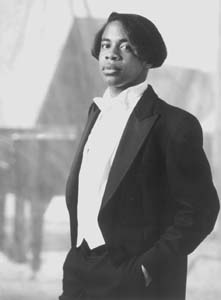![[MetroActive Arts]](/arts/gifs/art468.gif)
[ Arts Index | Santa Cruz Week | MetroActive Central | Archives ]
Mission of Mercy
Piano Camp: Soloist Terrence Wilson, featured in Michael Daugherty's 'Le Tombeau de Liberace' on the Cabrillo Music Festival's Aug. 14 program, dressed the part in flowing tails and high heels.
The closing Cabrillo Music Festival program takes an emotional toll
By Scott MacClelland
CABRILLO MUSIC FESTIVAL guest composer Sally Beamish knew that her piece, The Caledonian Road, would lead straight to the madhouse. But virtually no one else knew it until Marin Alsop and the festival orchestra sucked a sellout audience in the afternoon of Aug. 15 into a phantasmagorical vortex of shrieking insanity--namely, James MacMillan's The Confession of Isobel Gowdie. That this demonic exorcism should be carried out in the sanctuary of the Roman Catholic Church of Mission San Juan Bautista screams, as did the orchestra itself, for the mercy and forgiveness of God Almighty.
MacMillan's opus dares to venture into the mind of the Scottish "witch" Isobel Gowdie, who was strangled at the stake in 1662 after confessing a laundry list of bizarre and grotesque "sins." The piece begins and ends with whimpering moans and shudders. In between, the symphonic ensemble, heavy with brass and percussion, goes on a rampage of stunning and terrible effects, portraying what could be called a "hallucinator's guide to the orchestra."
Indeed, the performance exacted an emotional toll from music director Marin Alsop, who left the podium in a state of near shock. Her conducting, highly energized and articulate, had conveyed an awesome image, of which the audience, after a long moment of stunned silence, cheered its approval. In that context, the memory of Beamish's 12-minute excursion, a hybrid of reminiscence and artistic self-discovery, was fairly blotted out by MacMillan, who happens to be her colleague and mentor.
Violinist Yumi Hwang delivered the expressive highlight of the day in Aaron Jay Kernis' Lament and Prayer. The work reflects Kernis' own soul-searching on the Holocaust. Hwang's cantillations were deeply intoned, and the strings of the orchestra responded with a unison crescendo of breathtaking intensity. Richard Danielpour's Celestial Night showed a plentiful command of materials from minimalism to melodies but left little impression of the composer's affective personality. (Danielpour, for the second time, failed to appear as a promised festival guest composer.)
At the Civic
IN MICHAEL TORKE'S Jasper, on the previous night's program at the Santa Cruz Civic Auditorium, Alsop's orchestra displayed rough entrances that seemed to lack confidence. The composer's notes suggest an attempt to refract light with "scintillating" results. Either the musicians had not rehearsed enough or the work's excessive syncopations concealed the intended effects under an unnecessarily complex texture. Rough ensemble and ragged entrances in the winds, especially the brass, also dogged "Cryptic," the second movement of Aaron Copland's Statements, a brashly piquant collection of six "attitudes" composed in the mid-1930s.
The audience greeted pianist Terrence Wilson with hubbas when he entered the hall in Liberace drag. Excessively long tails and elevator shoes gave him a suitably Las Vegas image for Michael Daugherty's Le Tombeau de Liberace, which offered glittery licks from Adinsell, Grieg, Roger Williams and Mr. L himself. Lurid glissandos from various quarters enhanced Daugherty's inspired blend of brilliant compositional technique and vernacular music styles. Alsop ended the program with a handsome reading of Howard Hanson's Symphony no. 2 (Romantic), delineating the Nordic brass themes edgily, then sensitively smoothing them with warm, semitropical string breezes.
Copyright © Metro Publishing Inc. Maintained by Boulevards New Media.
![]()
 J. Henry Fair
J. Henry Fair
From the August 18-25, 1999 issue of Metro Santa Cruz.